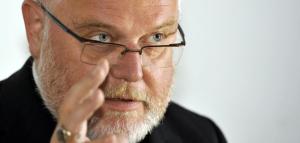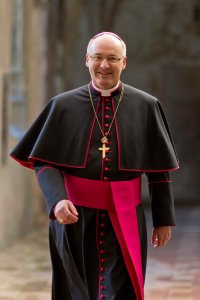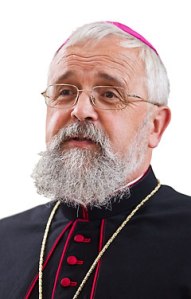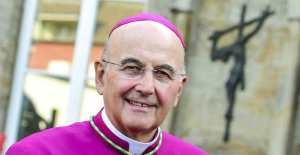After several years in which the Congregation for the Doctrine of the Faith was conspicuously silent, perhaps kept silent as Pope Francis tried to decrease its importance among the curial dicasteries, a new leadership brings new sounds. Or old sounds repeated, perhaps.
 Archbishop Luis Ladaria Ferrer, soon to be a cardinal, took over the reins at the CDF after Cardinal Gerhard Müller was let go about a year ago. And since then, the Congregation published two major texts: Placuit Deo on Christian salvation, in February, and Oeconomicae et pecuniariae quaestiones on ethics in economy (published jointly with the Dicastery for Integral Human Development), in May. In comparison, that is the same number of documents released during the entire period that Cardinal Müller headed the CDF, from 2012 to 2017.
Archbishop Luis Ladaria Ferrer, soon to be a cardinal, took over the reins at the CDF after Cardinal Gerhard Müller was let go about a year ago. And since then, the Congregation published two major texts: Placuit Deo on Christian salvation, in February, and Oeconomicae et pecuniariae quaestiones on ethics in economy (published jointly with the Dicastery for Integral Human Development), in May. In comparison, that is the same number of documents released during the entire period that Cardinal Müller headed the CDF, from 2012 to 2017.
And this week, another document was released, not by the CDF itself, but by its prefect, who, it may be safely assumed, is given much more freedom to function as Pope Francis’ personal choice to head the CDF. But that does not mean that something entirely new now comes from the offices of the Congregation. Archbishop Ladaria’s recent article focusses on an issue that has been debated for decades and it is firmly rooted in the teaching of Pope St. John Paul II.
On the issue of the ordination of women to the priesthood, Archbishop Ladaria once more confirms that that is not something the Catholic Church has the authority for. He writes the article in response to “voices heard in several countries which call into doubt” this doctrine, which was so clearly declared by Pope St. John Paul II, and confirmed by his successors. The archbishop stresses that what John Paul II stated in the 1994 Apostolic Letter Ordinatio sacerdotalis was definitive then, and remains so now.
Below I present my translation of the article, based on the German text found here.
“Remain in me, as I remain in you. Just as a branch cannot bear fruit on its own unless it remains on the vine, so neither can you unless you remain in me” (John 15:4). Only because of her roots in Jesus Christ, her founder, can the Church give life and salvation to the entire world. These roots are in the first place to be found in the sacraments, at the heart of which is the Eucharist. Established by Christ, the sacraments are the pillars of the Church, who is continuously built up by them as His body and His bride. The sacrament of ordination is deeply connected to the Eucharist, through which Christ makes Himself present as the source of her life and action. Priests are “conformed to Christ”, so that “they can act in the person of Christ the Head” (Presbyterorum ordinis, n. 2).
Christ wanted to confer this sacrament upon the twelve Apostles, who were all men, and they have, in time, conferred it upon other men. The Church knew herself to be bound to this decision of the Lord, which excludes validly conferring the ministerial priesthood to women. In the Apostolic Letter Ordinatio sacerdotalis, of 22 May 1994, John Paul II taught: “Wherefore, in order that all doubt may be removed regarding a matter of great importance, a matter which pertains to the Church’s divine constitution itself, in virtue of my ministry of confirming the brethren (cf. Lk 22:32) I declare that the Church has no authority whatsoever to confer priestly ordination on women and that this judgment is to be definitively held by all the Church’s faithful”(n. 4). The Congregation for the Doctrine of the Faith confirmed, in response to a question regarding the teaching of Ordinatio sacerdotalis, that this concerns a truth which belongs to deposit of faith (depositum fidei) of the Church.
In this light it is a great concern to me that there are voices heard in several countries which call into doubt the definitive character of the aforementioned teaching. In order to prove that this teaching is not definitive, the argument goes that is has not been defined ex cathedra and can thus be changed by a future pope or council. Spreading such doubts causes much confusion among the faithful, and not only with regard to the sacrament of Holy Orders, which belongs to he divine constitution of the Church, but also with regard to the ordinary Magisterium, which can infallibly pronounce Catholic doctrine.
On the first point: as for the ministerial priesthood, the Church knows that the impossibility of the ordination of women is part of the “substance” of the sacrament (cf. DH 1728). The Church lacks the authority to change this substance, as she is being built up as Church through the sacraments as established by Christ. This is not a matter of discipline, but a doctrine, as it concerns the structure of the sacraments, the first places of encounter with Christ and the transmission of faith. This is then not some obstacle which blocks the Church from fulfilling her mission in the world more effectively. When the Church can’t intervene in this question, the basis of it lies in the fact that the original love of God intervenes in it. He himself acts in the ordination of priests, so that, always and in every situation of its history, Jesus Christ is visible and active in the Church, “as the principal source of grace” (Pope Francis, Evangelii gaudium, n. 104).
In the awareness that she cannot change this tradition out of obedience to the Lord, the Church therefore tries to deepen its meaning. For the will of Jesus Christ, the Logos, is not without meaning. The priest acts in the person of Christ, the bridegroom of the Christ, and his being male is an indispensable aspect of this sacramental representation (cf. Congregation for the Doctrine of the Faith, Inter insigniores, n. 5). To be sure, the diversity of tasks between men and women does not entail subordination, but a mutual enrichment. It must be remembered that the perfect image of the Church is Mary, the mother of the Lord, to whom was not given the apostolic ministry. This makes evident that the original language of masculinity and femininity, which the Creator has inscribed in the human body, is included in the work of our salvation. Precisely this fidelity to Christ’s plan with the ministerial priesthood allows the continuous deepening and promotion of the role of women in the Church, because “Woman is not independent of man or man of woman in the Lord” (1 Cor, 11:11). This may also shine a light on our culture, which struggles to understand the meaning and beauty of the difference between man and woman, which also affects their complementary missions in society.
On the second point: the doubts raised about the definitive character of Ordinatio sacerdotalis also have a major effect on how the magisterium of the Church is to be understood. It is important to emphasise that infallibility not only refers to solemn declarations from a council or to papal definitions made ex cathedra, but also to the ordinary and general magisterium of the bishops spread throughout the world, when they declare, in unity with each other and with the pope, Catholic doctrine as ultimately binding. John Paul II based himself on this infallibility in Ordinatio sacerdotalis. He also did not declare a new dogma, but confirmed, to remove any doubts, with the authority given to him as succesor of Peter in a formal declaration, what the ordinary and general magisterium had presented as belonging to the deposit of faith throughout all of history. This very kind of statement corresponds with a style of ecclesial communion in which the pope does not wish to act alone, but as a witness in listening to an uninterrupted and living tradition. Furthermore, no one will deny that the magisterium can infallibly express truths that are necessarily connected to what was formerly revealed as good. For only in this way can it fulfill its task to keep the faith holy and interpret it faithfully.
Further proof of John Paul II’s efforts in considering this question is the prior consultation with the heads of those bishops’ conferences who most had to deal with the problem. All, without exception, declared with full confidence that the Church, out of obedience to the Lord, did not have the authority to allow women to receive the sacrament of ordination.
Pope Benedict XVI also confirmed this doctrine. In the Chrism Mass on 5 April 2012 he recalled how John Paul II had declared “irrevocably” that the Church “has received no authority from the Lord” regarding the ordination of women. With an eye on those who do not accept this teaching, Benedict XVI wonders, “But is disobedience really a way […]? Do we sense here anything of that configuration to Christ which is the precondition for all true renewal, or do we merely sense a desperate push to do something to change the Church in accordance with one’s own preferences and ideas?”
Pope Francis has likewise taken position on this question. In his Apostolic Letter Evangelii gaudium he underlines: “The reservation of the priesthood to males, as a sign of Christ the Spouse who gives himself in the Eucharist, is not a question open to discussion.” He also urges us not to interpret this doctrine as an expression of power, but as a service, so that the equal dignity of man and woman in one body of Christ may be better understood (n. 104). In the press conference during the return flight from the apostolic journey to Sweden on 1 November 2016 Pope Francis emphasised: “As for the ordination of women in the Catholic Church, the last clear word was given by Saint John Paul II, and this holds.”
The Church in our time is called to response to many challenges of our culture. It is essential that she remains in Christ, like the branches on the vine. The Master therefore invites us to keep His word in us: “If you keep my commandments, you will remain in my love” (John 15:10). Only being faithful to His words, which do not fade, guarantees our rootedness in Christ and in is love. Only the accepting of His wise plans, which take shape in His sacraments, strengthens the Church at her roots, so that she can bear fruit for eternal life.
Luis F. Ladaria, SJ, Prefect of the Congregation for the Doctrine of the Faith”
 Words from Pope Francis, in an audience with delegates from the German Lutheran Church yesterday. He was, not unexpectedly, speaking about ecumenism, urging continuing theological dialogue between various Christian churches and communities. The goals of ecumenism are often enticing, and this may cause some to get ahead of themselves. The themes Pope Francis mentioned – the Church, the Eucharist and the ecclesial ministry – reflect the goals of a shared understanding of what the Church is, a shared belief in the Eucharist and a shared understanding of the priesthood and other ministries in the Church, and which are often assumed to have been achieved already.
Words from Pope Francis, in an audience with delegates from the German Lutheran Church yesterday. He was, not unexpectedly, speaking about ecumenism, urging continuing theological dialogue between various Christian churches and communities. The goals of ecumenism are often enticing, and this may cause some to get ahead of themselves. The themes Pope Francis mentioned – the Church, the Eucharist and the ecclesial ministry – reflect the goals of a shared understanding of what the Church is, a shared belief in the Eucharist and a shared understanding of the priesthood and other ministries in the Church, and which are often assumed to have been achieved already. This quote is especially interesting as a document was leaked yesterday which stated that the German bishops’ proposed pastoral outreach to interdenominational couples – which included the proposal to allow non-Catholic spouses to receive Communion under certain circumstances – is not fit to be published. The document is dated on the 25th of May, and was sent by the prefect of the Congregation of the Doctrine of the Faith, Archbishop Luis Ladaria, to the German bishops who participated in the meeting with the CDF and other dicasteries on 3 May. The letter makes it clear that it was sent with the express agreement of the Pope, who discussed the matter with Archbishop Ladaria in two separate audiences.
This quote is especially interesting as a document was leaked yesterday which stated that the German bishops’ proposed pastoral outreach to interdenominational couples – which included the proposal to allow non-Catholic spouses to receive Communion under certain circumstances – is not fit to be published. The document is dated on the 25th of May, and was sent by the prefect of the Congregation of the Doctrine of the Faith, Archbishop Luis Ladaria, to the German bishops who participated in the meeting with the CDF and other dicasteries on 3 May. The letter makes it clear that it was sent with the express agreement of the Pope, who discussed the matter with Archbishop Ladaria in two separate audiences. Cardinal Reinhard Marx, president of the German Bishops’ Conference and one of the supporters of the pastoral outreach, has admitted his surprise as the CDF letter. Perhaps rightly, he contrasts it with the initial request from the pope, that the bishops try and find a solution that is as unanimous as possible. Cardinal Marx said that that hasn’t been tried, let alone achieved, yet. He sees the need to discuss the topic in the meetings of the standing council of the conference and the autumn plenary meeting, but also with the dicasteries in Rome and with the Holy Father himself.
Cardinal Reinhard Marx, president of the German Bishops’ Conference and one of the supporters of the pastoral outreach, has admitted his surprise as the CDF letter. Perhaps rightly, he contrasts it with the initial request from the pope, that the bishops try and find a solution that is as unanimous as possible. Cardinal Marx said that that hasn’t been tried, let alone achieved, yet. He sees the need to discuss the topic in the meetings of the standing council of the conference and the autumn plenary meeting, but also with the dicasteries in Rome and with the Holy Father himself. Archbishop Luis Ladaria Ferrer, soon to be a cardinal, took over the reins at the CDF after Cardinal Gerhard Müller was let go about a year ago. And since then, the Congregation published two major texts: Placuit Deo on Christian salvation, in February, and Oeconomicae et pecuniariae quaestiones on ethics in economy (published jointly with the Dicastery for Integral Human Development), in May. In comparison, that is the same number of documents released during the entire period that Cardinal Müller headed the CDF, from 2012 to 2017.
Archbishop Luis Ladaria Ferrer, soon to be a cardinal, took over the reins at the CDF after Cardinal Gerhard Müller was let go about a year ago. And since then, the Congregation published two major texts: Placuit Deo on Christian salvation, in February, and Oeconomicae et pecuniariae quaestiones on ethics in economy (published jointly with the Dicastery for Integral Human Development), in May. In comparison, that is the same number of documents released during the entire period that Cardinal Müller headed the CDF, from 2012 to 2017.
 Opposing the actions of the seven bishops is Bishop Gerhard Feige, bishop of Magdeburg and president of the ecumenism commission of the German Bishops’ Conference. In a contribution to Der Zeit last Thursday, Msgr. Feige stated that not taking the chance to help people deepen the joy of the faith and their participation in the Eucharist, as well as promoting ecumenical encounters and strengthening the marriage bond would be “macabre and shameful”. Contrary to other bishops, Msgr. Feige insists that the pastoral outreach exists within modern theological and legal possibilities, referring to the canon law paragraphs which allow local bishops to decide under which circumstances non-Catholic can receive Communion. These circumstances, however, are emergency situations in which the danger of death and the unavailability of ministers of a person’s own denomination play key roles.
Opposing the actions of the seven bishops is Bishop Gerhard Feige, bishop of Magdeburg and president of the ecumenism commission of the German Bishops’ Conference. In a contribution to Der Zeit last Thursday, Msgr. Feige stated that not taking the chance to help people deepen the joy of the faith and their participation in the Eucharist, as well as promoting ecumenical encounters and strengthening the marriage bond would be “macabre and shameful”. Contrary to other bishops, Msgr. Feige insists that the pastoral outreach exists within modern theological and legal possibilities, referring to the canon law paragraphs which allow local bishops to decide under which circumstances non-Catholic can receive Communion. These circumstances, however, are emergency situations in which the danger of death and the unavailability of ministers of a person’s own denomination play key roles. Münster’s Bishop Felix Genn is hopeful of finding a consensus. While the way in which the seven bishops expressed their difficulties with the conference’s vote did not make him happy, he understands their questions of conscience. In an interview for WDR radio Bishop Genn expressed his happiness about the way in which the standing council of the bishops’ conference discussed the issue last week. And although he would have preferred that the seven bishops had first informed the others about their letter before sending it, Bishop Genn’s attitude is perhaps the most consensus-minded in the delegation, which may be a reason for his inclusion. The bishop, for his part, simply thought of his mother’s motto when hearing about being included in the delegation: “One has never got enough work to do.”
Münster’s Bishop Felix Genn is hopeful of finding a consensus. While the way in which the seven bishops expressed their difficulties with the conference’s vote did not make him happy, he understands their questions of conscience. In an interview for WDR radio Bishop Genn expressed his happiness about the way in which the standing council of the bishops’ conference discussed the issue last week. And although he would have preferred that the seven bishops had first informed the others about their letter before sending it, Bishop Genn’s attitude is perhaps the most consensus-minded in the delegation, which may be a reason for his inclusion. The bishop, for his part, simply thought of his mother’s motto when hearing about being included in the delegation: “One has never got enough work to do.”


 Afterwards he went to Japan, which at that time was most certainly an unassailable fortress. But he managed to reach the emperor and was even permitted to proclaim his faith. Francis Xavier would certainly have been aware of the fact that he could not convert the entire world. And he must have realised that not everyone he baptised was as enthusiastic in putting his faith into practice. But that did not stop him from wanting to continue witnessing of Christ.
Afterwards he went to Japan, which at that time was most certainly an unassailable fortress. But he managed to reach the emperor and was even permitted to proclaim his faith. Francis Xavier would certainly have been aware of the fact that he could not convert the entire world. And he must have realised that not everyone he baptised was as enthusiastic in putting his faith into practice. But that did not stop him from wanting to continue witnessing of Christ.

 Going by the date of creation, Eugênio de Araújo Sales was the most senior cardinal in the College until his death last night. At the age of 91 the former archbishop of Rio de Janeiro came to the end of a life marked by service to the Church in his native Brazil, and the numbers of that life are certainly impressive. A priest for more than 68 years, a bishop for almost 58, and a cardinal for a little over 43 years…
Going by the date of creation, Eugênio de Araújo Sales was the most senior cardinal in the College until his death last night. At the age of 91 the former archbishop of Rio de Janeiro came to the end of a life marked by service to the Church in his native Brazil, and the numbers of that life are certainly impressive. A priest for more than 68 years, a bishop for almost 58, and a cardinal for a little over 43 years…